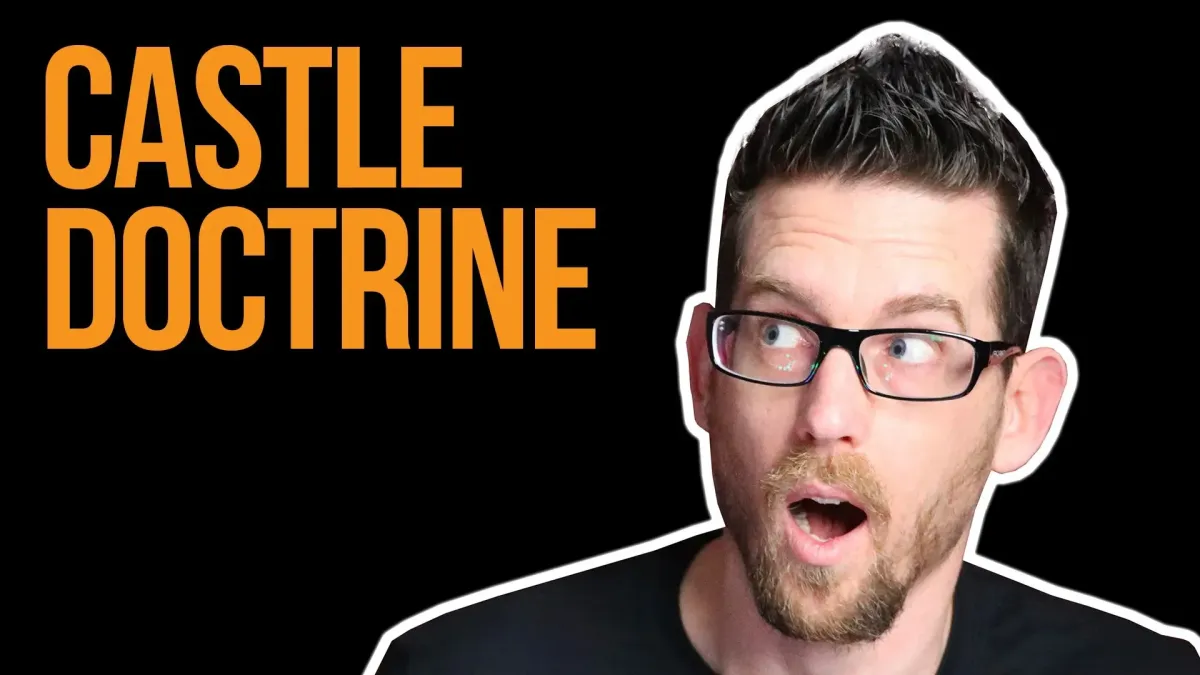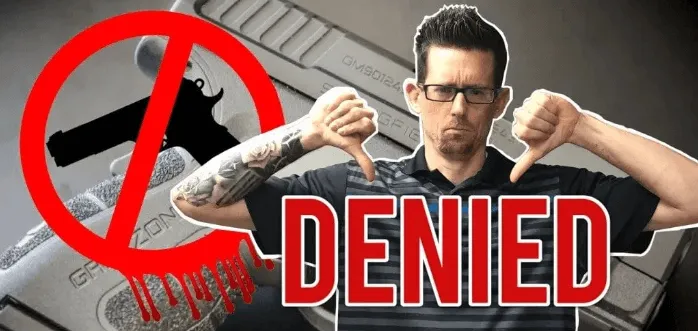Florida Concealed Carry Law Blog
Follow Us for News, Tips , Tricks, Guns Gear and Real Life Stories

A Complete Guide to The Florida Castle Doctrine Law
If you've lived in Florida for a while, you've probably heard of the Florida castle doctrine law. The castle doctrine gives you the legal right to use or threaten the use of a firearm when you are located inside of your castle. This would include your residence, dwelling, or an occupied vehicle.
What Is The Florida Castle Doctrine Law?
The castle doctrine is a common law doctrine, stating that a person has no duty to retreat in his or her home or castle and may use reasonable force, including deadly force, to defend his or her property, person, or someone else. This doctrine gives you two powerful presumptions.
How Does the Castle Doctrine Law Work?
Under the Florida "castle doctrine" law, you have the right to presume, or assume, two really important things. The first presumption is that you have the right to stand your ground, as outlined in Florida Statute 776.013:
Florida Statute 776.013 (1) A person who is in a dwelling or residence in which the person has a right to be has no duty to retreat, and has the right to stand his or her ground and use or threaten to use:
I'm not going to complete that sentence yet because I want to hold off and explain the second presumption, so we're going to come back to it later. The second presumption is that you have the right to believe that the attacker is planning to commit an unlawful act involving force or violence. This is outlined in Florida Statute 776.013:
Florida Statute 776.013 (4) A person who unlawfully and by force enters or attempts to enter a person's dwelling, residence, or occupied vehicle is presumed to be doing so with the intent to commit an unlawful act involving force or violence.
It's important to note that, in order for the second presumption to be in effect, the attacker must be entering or attempting to enter, unlawfully and by force, a dwelling, residence, or occupied vehicle. We're going to discuss what these terms mean in a later section, but first, let's discuss what can eliminate the presumptions granted to us under the law.
What Can Remove the Presumptions?
According to Florida Statute 776.013(3), the presumption granted under the law can be eliminated in four ways.
The first way the presumption can be eliminated is if the person who entered your dwelling, residence, or occupied vehicle has a legal right to be there.
Florida Statute 776.013(3)(a) The person against whom the defensive force is used or threatened has the right to be in or, is a lawful resident of the dwelling, residence, or vehicle, such as an owner, lessee, or title holder, and there is not an injunction for protection from domestic violence or a written pretrial supervision order of no contact against that person.
The second way the presumptions can be eliminated is if the person being removed is a child or grandchild and the person removing the child or grandchild has lawful custody. Here's what it says:
Florida Statute 776.013(3)(b) The person or person sought to be removed is a child or grandchild, or is otherwise in the lawful custody or under the lawful guardianship of, the person against whom the defensive force is used or threatened.
If Tiffany and I were ever to get separated and I decided to swing by the house and pick up one or all of my kids, Tiffany would not have a legal right to use or threaten the use of a gun because I have just as much legal right to take my children as she does. Obviously this would only apply if we had joint custody and no restraining orders.
The third way these presumptions can be eliminated is if the person who uses or threatens to use deadly force is engaging in criminal activity. Here's what the law says:
Florida Statute 776.013(3)(c) The person who uses or threatens to use defensive force is engaged in a criminal activity or is using the dwelling, residence, or occupied vehicle to further a criminal activity.
Obviously, if you're making meth in your garage, then you do not have a right to use or threaten the use of deadly force.
The final way the presumptions can be eliminated is if the person against whom defensive force was used was a law enforcement officer. Here’s what the law says:
Florida Statute 776.013(3)(d) The person against whom the defensive force is used or threatened is a law enforcement officer. As defined in Florida Statute 943.10(14) who enters or attempts to enter a dwelling, residence, or vehicle in the performance of his or her official duties. And the officer identified himself or herself in accordance with any applicable law or the person using or threatening to use force knew or reasonably should have known that the person entering or attempting to enter was a law enforcement officer.
It should go without saying, but you never have a right to use a firearm against law enforcement.
When Is It Legal To Use Using Deadly Force?
Using or threatening to use deadly force should never be a decision that is taken lightly. The Florida castle doctrine outlines the specific requirements that must occur before you are allowed to use or threaten the use of deadly force.
Florida Statute 776.013(2) a person is presumed to have held a reasonable fear of imminent peril of death, or great bodily harm, to himself or herself, or another, when using or threatened to use defensive force that is intended or likely to cause death, or great bodily harm to another.
Dictionary.com defines the word presumed as “suppose that something is the case, based on probability.”
When reading Florida Statute 776.013(2), I'm sure you also notice the word “if.” This means that before you can use or threaten the use of deadly force, certain requirements must be met under the law. Florida law provides two statutes that must be met before this presumption can be made.
Florida Statute 776.013(2)(a) The person against whom the defensive force was used, or threatened, was in the process of unlawfully and forcibly entering, or had unlawfully and forcibly entered, a dwelling residence or occupied vehicle, or if that person had removed, or was attempting to remove, another, against that person's will, from the dwelling, residence, or occupied vehicle.
The first requirement clearly states that the attacker must be in the process of unlawfully and forcibly entering, or the attacker has already unlawfully and forcibly entered, a dwelling, residence, or occupied vehicle, or the attacker has already removed, or is it attempting to remove, a person, against that person's will, from their dwelling, residence, or occupied vehicle. The second requirement that must be met before you can use, or threaten the use of deadly force, under the castle doctrine law, is found in Florida Statute 776.013(2)(b) Here’s what it says:
Florida Statute 776.013(2)(b) The person who uses, or threatens to use, defensive force, knew, or had reason to believe, that an unlawful and forceable entry, or unlawful and forceable act, was occurring, or had occurred.
In order to fully understand these two statutes, we've got to take a moment to break down some of the key words that we just discussed.
What Does Unlawful Entry Mean?
The very first key word we're going to discuss is unlawful entry. What does unlawful entry mean?
Florida Statute 82.01(5) Unlawful entry means that entry into and possession of real property, even if the possession is temporary or for a portion of the real property, when such entry is not authorized by law or consented to by a person entitled to possession of the real property.
This means that the attacker does not have a legal right to be inside your home or your occupied vehicle, or they were not invited.
What Does by Force Mean?
Unfortunately, I couldn't find a statutory definition for the term “by force.” However, I did find a definition for the term “forcible entry.”
Florida Statute 82.01(1) forcible entry means entering into and taking possession of real property with force in a manner that is not peaceable, easy or open, even if such entry is authorized by a person entitled to possession of the real property, and the possession is only temporary or applies only to a portion of the real property.
In my opinion, entering a home by force would include kicking in a door, breaking a window, or even picking a lock.
According to Florida courts, this could also mean a door that is shut but unlocked. However, if your sliding glass door was wide open and an attacker just walked right in, this would not be considered by force, and you would not have a right to use or threaten the use of deadly force according to the castle doctrine law.
What Is a Dwelling?
Florida Statute 776.013(5)(a) Dwelling means a building or conveyance of any kind, including any attached porch, whether the building or conveyance is temporary or permanent, mobile or immobile, which has a roof over it, including a tent, and is designed to be occupied by people lodging therein at night.
A dwelling could be your house, a hotel room, a camper, an RV, or even a tent, or any building designed for people to sleep in.
What Is a Residence?
Florida Statute 776.013(5)(b) “Residence” means a dwelling in which a person resides either temporarily or permanently or is visiting as an invited guest.
One of the most common questions that I receive is, “What if I'm invited to my brother or a family member's house or a friend's house and some bad guy tries to kick in the door? Am I allowed to use or threaten the use of deadly force as an invited guest?” Yes. This statute clearly states that you have the exact same rights as that homeowner.
What Does Occupied Vehicle Mean?
Florida Statute 776.013(5)(c) "Vehicle" means a conveyance of any kind, whether or not motorized, which is designed to transport people or property.
The castle doctrine, Florida Statute 776.013(2)(a), clearly states that it must be an occupied vehicle. This means that an individual must be inside of the vehicle before you can use or threaten the use of deadly force. Just imagine for a second, you pull into a gas station. You want to run in and grab an energy drink, but you're in a rush. So, you decide to leave your car running because we all know it takes so long to start your car.
While you're inside, you see a man get into your car and begin to drive away. Now there's no one in your car except the bad guy. Do you have a legal right to whip out your gun and just start cranking rounds at this car? Of course not.
Because according to the castle doctrine, someone other than the bad guy would have to be inside of the vehicle before the castle doctrine statute would be in effect. Because the vehicle was empty when the bad guy got in, you would not have a right to use or threaten the use of deadly force.
When Is It Legal To Use Non-Deadly Force?
In order to use or threaten the use of deadly force, the attacker must enter your home, dwelling, or occupied vehicle by force, and unlawfully. But what if your front door is wide open and a person walks into your house? According to Florida Statute 776.013(1)(a), you would only have a right to use non-deadly force. Here's what the statute says:
Florida Statute 776.013(1) A person who is in a dwelling or residence in which the person has a right to be has no duty to retreat and has the right to stand his or her ground and use or threaten to use:
(a) Non-deadly force against another when and to the extent that the person reasonably believes that such conduct is necessary to defend himself or herself or another against the others imminent use of unlawful force.
So, you would only have a right to use or threaten the use of deadly force if it was necessary to prevent imminent death, great bodily harm, or the imminent commission of a forcible felony.
Florida Statute 776.013 (1) A person who is in a dwelling or residence in which the person has a right to be has no duty to retreat and has the right to stand his or her ground and use or threaten to use:
(b) Deadly force if he or she reasonably believes that using or threatening to use such force is necessary to prevent imminent death or great bodily harm to himself or herself or another, or to prevent the imminent commission of a forcible felony.
Here's an example: Just imagine you're sitting in your living room on a beautiful day. You decided to open your sliding glass doors and windows to allow the cool breeze into your home. Suddenly a strange man walks into your home and stands in your living room. This strange person doesn’t say anything and doesn’t have any weapons.
In this situation, what level of force would you be allowed to use?
In my opinion, you would be legally allowed to use physical force to remove this person from your house. However, the use of deadly force would not be permitted because the strange man did not enter your home by force, which is one of the requirements outlined in Florida Statute 776.031(2)(a).
This entire scenario would change if the strange man walking into your home was holding a weapon — let's say a knife, a tire iron, something of that nature — because you would now have a reasonable belief of imminent death. Hopefully this is making a little bit of sense to you guys.
That's all I have for today. So until next time keep training and stay safe...
Ryan G. Thomas
P.S. You’re one step away from getting your Florida concealed carry permit….FAST & EASY…
And for a limited time you can watch the concealed carry course online for free... Click here to get started...
Don't Miss a Thing!
Get Notified When We Post a New Article
Most Popular Concealed Carry Articles

Florida Private Gun Sales Rules

Am I Eligible For A Florida Concealed Carry Permit?
Get FREE Access To The Florida Concealed Carry Masterclass™
Join over 60,000 Floridians Who Chose Tampa Carry To Get Their Florida Concealed Carry Permit
All rights Reserved. Copyright 2026 Tampa Carry



